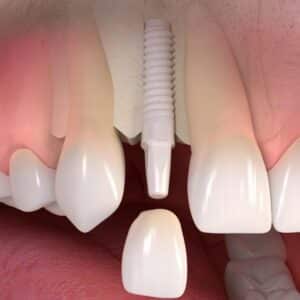In the realm of modern dentistry, the quest for optimal smile restoration options has led to remarkable advancements, among which zirconia implants shine as a beacon of innovation. Zirconia implants, hailed for their durability, aesthetic appeal, and biocompatibility, offer individuals seeking to restore their smiles a viable alternative to traditional dental prosthetics. With the ever-growing demand for natural-looking and long-lasting tooth replacements, zirconia implants have emerged as a frontrunner in the field of restorative dentistry.
Zirconia implants represent a paradigm shift in smile restoration, providing patients with a reliable solution that combines strength, stability, and aesthetic excellence. As individuals explore their options for achieving a radiant and confident smile, understanding the merits and considerations of zirconia implants becomes paramount.
In this blog, we delve into the intricacies of zirconia implants as a smile restoration option, exploring their advantages, procedural aspects, aftercare requirements, and patient experiences.
Advantages of Zirconia Implants
Zirconia implants offer several advantages as a smile restoration option, making them a popular choice for individuals seeking durable and natural-looking tooth replacements.
Biocompatibility and durability: Zirconia, a ceramic material, exhibits excellent biocompatibility, meaning it is well-tolerated by the body. Moreover, zirconia implants boast exceptional durability, ensuring they withstand the rigors of daily use without compromising on performance or longevity.
Aesthetic appeal: One of the standout features of zirconia implants is their aesthetic appeal. The material closely resembles natural teeth in color and translucency, allowing for seamless integration with surrounding dentition. This results in a smile that looks remarkably natural and enhances overall facial aesthetics.
Reduced risk of allergic reactions: Unlike some metal-based implants, zirconia implants pose minimal risk of allergic reactions or sensitivities. This makes them suitable for individuals with metal allergies or sensitivities, ensuring a safe and comfortable treatment experience.
Strength and stability: Zirconia implants are renowned for their robustness and stability, providing a solid foundation for long-term tooth replacement. With proper care and maintenance, zirconia implants can withstand the forces of chewing and biting, offering reliable performance for years to come.
Tissue-friendly properties: Zirconia implants exhibit tissue-friendly properties, meaning they are gentle on the gums and surrounding soft tissues. This reduces the risk of inflammation and irritation, promoting optimal healing and ensuring patient comfort throughout the treatment process.
Resistance to corrosion: Unlike metal implants, zirconia implants are highly resistant to corrosion, making them an ideal choice for individuals seeking a low-maintenance and long-lasting smile restoration solution. This corrosion resistance contributes to the overall durability and reliability of zirconia implants, offering peace of mind to patients.
Considerations Before Choosing Zirconia Implants
Before opting for zirconia implants, it’s essential to consider several factors to ensure they are the right choice for your smile restoration needs:
Evaluation of candidacy:
Prior to proceeding with zirconia implants, it’s crucial to undergo a comprehensive evaluation by a qualified dental professional. This assessment will involve examining factors such as oral health, bone density, and gum condition to determine your suitability for the procedure. Additionally, any underlying medical conditions or medications that may affect the outcome of the treatment will be taken into account.
Comparison with other options:
While zirconia implants offer numerous benefits, it’s essential to compare them with alternative smile restoration options, such as traditional dental implants or dental bridges. Each option has its own set of advantages and considerations, and a thorough discussion with your dentist can help you make an informed decision based on your unique needs and preferences.
Cost factors and insurance coverage:
Cost is an important consideration when choosing zirconia implants. The total expense may vary depending on factors such as the number of implants required, any additional procedures needed, and the location of the dental practice. It’s advisable to discuss the full cost breakdown with your dentist and inquire about potential insurance coverage or financing options to make the treatment more affordable. Additionally, some dental insurance plans may offer partial coverage for zirconia implants, so be sure to check your policy for details.

Zirconia Implant Procedure
The process of receiving zirconia implants typically involves several key stages, each essential for ensuring successful smile restoration:
Initial consultation and treatment planning: The journey begins with an initial consultation with your dentist or oral surgeon, during which your oral health will be assessed, and your treatment goals will be discussed. This phase also involves comprehensive diagnostic tests, such as dental imaging or 3D scans, to evaluate bone structure and determine the optimal placement of the implants.
Surgical placement of zirconia implants: Once the treatment plan is finalized, the surgical placement of the zirconia implants takes place. This procedure is usually performed under local anesthesia to ensure patient comfort. The dentist or oral surgeon will carefully insert the implants into the jawbone at precise locations determined during the planning phase. Zirconia implants are known for their biocompatibility and durability, offering a reliable foundation for prosthetic teeth.
Healing and osseointegration process: After the implants are placed, a period of healing is required to allow for osseointegration, which is the fusion of the implants with the surrounding bone tissue. This process typically takes several months and is crucial for ensuring the stability and longevity of the implants.
Restoration phase and customization of prosthetic teeth: Once the implants have fully integrated with the jawbone, the restoration phase begins. During this stage, customized prosthetic teeth, such as crowns or bridges, are fabricated to attach to the implants. These prosthetic teeth are meticulously designed to blend seamlessly with the natural teeth in size, shape, and color, resulting in a beautifully restored smile that looks and functions like natural teeth.
Aftercare and Maintenance of Zirconia Implants
Aftercare and maintenance are crucial for ensuring the long-term success of zirconia implants. Here are some key considerations:
- Oral hygiene practices for zirconia implants: Maintaining good oral hygiene is essential for preventing complications such as gum disease or implant failure. Patients should brush their teeth at least twice daily using a soft-bristled toothbrush and non-abrasive toothpaste. Additionally, flossing and using antimicrobial mouthwash can help remove plaque and bacteria from around the implants.
- Regular dental check-ups and professional cleanings: Routine visits to the dentist are essential for monitoring the health of the implants and surrounding tissues. Dentists can identify any issues early on and provide appropriate treatment to prevent further complications. Professional cleanings are also necessary to remove stubborn plaque and tartar buildup that cannot be removed through regular brushing and flossing.
- Lifestyle adjustments and dietary considerations: Patients with zirconia implants should avoid habits such as smoking, which can increase the risk of implant failure. Additionally, certain foods and beverages, such as hard candies or acidic drinks, should be consumed in moderation to prevent damage to the implants or surrounding tissues.
- Addressing common concerns and troubleshooting issues: Patients should be aware of common concerns associated with zirconia implants, such as temporary discomfort or swelling following the procedure. If any unusual symptoms or complications arise, patients should contact their dentist promptly for further evaluation and treatment.
Zirconia implants offer a durable, aesthetic, and biocompatible smile restoration option for individuals seeking long-term tooth replacement. With their natural appearance and strength, coupled with proper care and maintenance, zirconia implants can provide patients with a confident and lasting smile.



